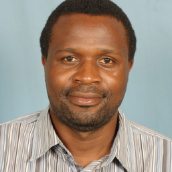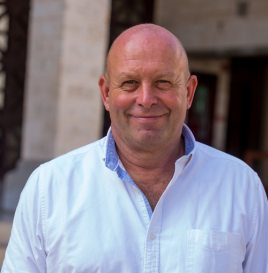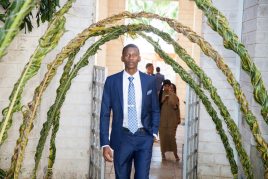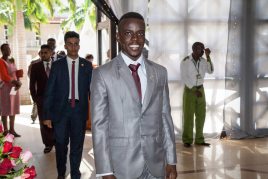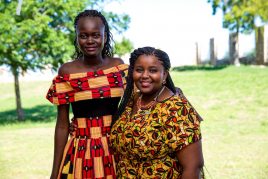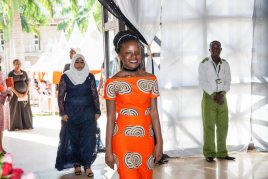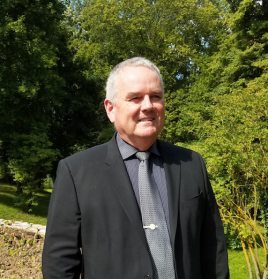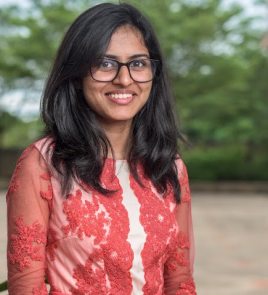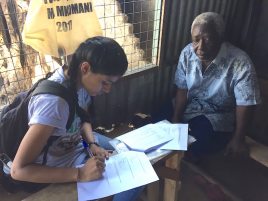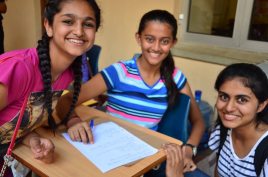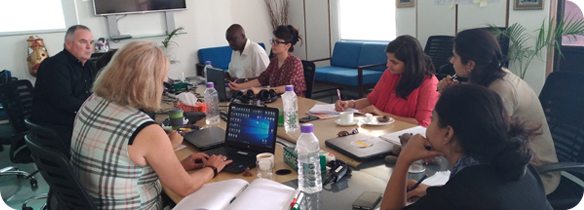
Teacher Professional Development
Promoting excellence in teaching and learning, both on campus and more broadly, is a fundamental goal of the Aga Khan Academies. Each Academy has a Professional Development Centre (PDC), which strengthens the profession of teaching in the region by investing substantially in teachers’ professional development.
Developing strength in teaching
We identify and develop teachers of the highest quality who are committed both to the all-round development of young people and to their own professional growth as excellent teachers.
Our PDC supports excellence in teaching by promoting best practices in teaching and learning. We provide ongoing, collaborative training for Academy faculty as well as outreach programmes for teachers and head teachers from neighbouring government, private and not-for-profit schools. Our faculty members also have the opportunity to collaborate with colleagues across the globe and to teach abroad within the Aga Khan Academies network.
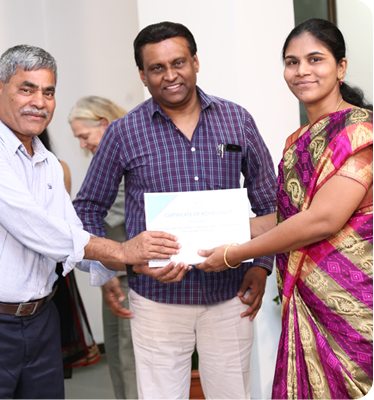 Learning at the PDC
Learning at the PDC
Progamming at the Academy’s PDC began in June 2010 with a course from the Professional Learning for Educators Series (PLES). The PLES programmes are designed by the Aga Khan Academies. They respond to the need to improve the standard of teaching and learning identified during extensive market research and interaction with government and departments of education.
The series includes programmes for teachers in various subject areas as well as specialised programmes focusing on skills and understandings related to education. We build professional competence by enhancing teachers’ subject knowledge and by examining how to teach that subject effectively. Each programme provides participants with a balance of intensive learning activities followed by an extended period of assisted application and observation within their own classrooms.
Strengthening curriculum and community
Through our professional development provision, we help create a professional community of competent, well-resourced teachers. These teachers will continue to support and collaborate with one another on resource development, by sharing best practices, and in establishing diverse academic, cultural and social projects.
Zviko Katsande: Zimbabwean educator embodies global-mindedness
Talent Identification Students: Creators of destiny
One of the great African presidents, Julius Nyerere, once said that the point of education was to turn creatures of destiny into creators of destiny. As the Dean of Admissions and Financial Aid at the Aga Khan Academy Mombasa, I have passionately led a Talent Identification Programme for nearly ten years now. The programme identifies “creators of destiny”, students in Year 6 in Kenyan government schools, in deprived socio-economic and educational areas of Kenya, who are academically able and show leadership potential. This May, seven of these students have fulfilled part of their destiny, in graduating from the IB Diploma Programme. Six of these seven students have secured a path to their next destination in life, by gaining access to some of the best universities in the world, on full scholarships. The Academy has guided and nurtured the students to have the confidence to become “creators of destiny”. The vision of His Highness the Aga Khan is that these students, as well as other members of the 2018 graduating class, will go out and be creators of change in their own communities.
As a teacher, the idea of educating a child for profit has always repelled me. The Academy’s inclusive culture was one of the factors that appealed to me when I first applied for the post at the school, as was the opportunity to lead the Talent Identification Programme. (Coming from a very working class background myself, I know that my parents would never have afforded me the opportunity to gain access to a secondary or higher education, without the assistance of the state system in the United Kingdom). From the outset, I can honestly say that not all teachers were supportive of bringing these students into the school’s residential programme. I did have a picture in my mind of how successful this could be from my work at previous schools, but I must admit, I did have sleepless nights about the scale, severity and scope of it all.
The assessment process in identifying these students has evolved and refined over the years. One very important aspect of innate leadership that is assessed is that of inferential thinking, the ability to make connections across different areas of knowledge. From this graduating cohort, I always remember one of the students exhibited exceptional ability in this area. Japheth Otieno, at the age of 11 then, referred to the inter-relation between governments causing difficulties in a problem solving activity when he mentioned, “Imagine that a Country A is helping Kenya with aid and money. Imagine that another Country B is an enemy of Kenya. Conflict may arise between Countries A and B, as there is suspicion over the reasons for this assistance to Kenya.” In the selection interviews, we look for students who are likely to question their world, have a keen sense of justice and morality, have good verbal communication skills and a sense of extra-curricular involvement. Japheth impressed me with his references to whether there was a multi-level universe or not and his passion for his kitchen garden, where he had initiated some preventative measures for protecting his plants. Japheth has now secured a place with the King-Morgridge Scholarship at the University of Wisconsin Madison in the United States.
I am delighted that this cohort sees the first student from the Ganze area, William Baya, graduating. I remember meeting William for the first time in 2011. At that time, the Kilifi County Governor reported widespread hunger in some parts of the county, especially for families living in the semi-arid areas. Learning in hundreds of primary schools in hunger-stricken parts of the country had been paralysed as the government dispatched emergency relief supplies. It was against this backdrop that we first met William, then a student at Vitengeni Primary School. William had already showed some leadership traits with him being involved as a scout commander and a school prefect. His school felt that he was a responsible and determined pupil. He mentioned about working hard in life so that he could target his goals – his motto at that time was “front ever, back never”. The self-drive William displays from adhering to this motto has guided him through the six years at the school and given him a full scholarship to attend Washington and Lee University in the United States. On learning of this, his father beaming with great pride said, “The Aga Khan Academy Mombasa has transformed my boy and that I am looking forward to him to come back and work for the community to repay the Aga Khan's contribution.”
One unique aspect of the Aga Khan Academy Mombasa, is its double heritage of world-mindedness and its proud East African identity. Since the inception of the school in 2003, Swahili has been compulsory for all students up to 14 years of age. His Highness recognised the need for young leaders to be able to communicate in their national language with other members of their community. (It is interesting to note that other non-national schools have only recently introduced Swahili into the curriculum for all students after a recent government directive). The Academy is at the forefront of academic thinking and is always forward thinking.
The development of the students in the school to “creators of destiny” is by no means left to chance. From this double heritage foundation, important concepts such as those of meritocracy, pluralism, ethics and other virtues and attributes that make up the students’ learner profile, have been integrated into all aspects of the curriculum. The students are allowed to run the risk, among other things, of failure because the privation of not succeeding can be an excellent teacher. Students are also given responsibility so that they can experience and learn from taking leadership roles. This is encouraged in every student. The students take charge in aspects of enrichment, academics and service, so that they are held accountable and answerable for their decisions, both when they get it right and when they fail.
Prudence Hainga after graduating this year will join the University of Edinburgh to study Political Science. Prudence reflected on what this scholarship meant to her and her community. “I want to realise my childhood dream of fighting injustice and corruption in Kenya. Having experienced and witnessed different levels of inequality in my country, I want to delve into a career path that will help me change what has become a detrimental routine in my country. The Kenyan political system is majorly defined by tribalism and inequality. Therefore, learning how political systems function and what others have done to ensure sustainable development as well as spread out opportunities for their citizens, will help me to decipher ways in which I could impact change in my country’s political system and rid Kenya of tribalism and greed. I am motivated to use my knowledge as a weapon against discrimination and inequality and work for a better Kenya – a Kenya that feels like home to all.”
These young men and women who have benefited from this progamme, did not have a great deal when they first came to the Academy, and their future was continually uncertain, with parents struggling to secure jobs, keep food on the table as well as educating their children. To see them grow and nurture and fulfil what was expected of them at this moment in time brings a lot of satisfaction. I have taught in many schools throughout the world, but there is something unique and special about this graduating class and other students at the school. The school recently had a visit from the representative from the International Baccalaureate Organization. On commenting on the school the one thing that stood out in my mind was his reference to the children here. He simply said that the children were “staggering”. These staggering students are helping to fulfil our mission for the Aga Khan Academy Mombasa that fits with building a better Kenya.
By Paul Davis
Jonathon Marsh: Supporting the quality of teaching at the Academies
Jonathon Marsh has system-wide responsibility for teacher development at the Aga Khan Academies network. Having worked for the Academies for the past 10 years, he has previously had leadership roles in education in Canada, Hong Kong, the United Arab Emirates and the United Kingdom, including as the Head of Professional Development and Research for the International Baccalaureate. In this interview, he shares the highlights of his position at the Academies, and reflects on how the Academies are unique from other educational institutions.
Tell us the journey that led you to the Academies.
I first came across the AKDN when I was in Hong Kong. I read a recruitment ad in the Times Higher Education magazine seeking people to fill positions at the then recently opened Aga Khan University in Karachi. I remember looking at the ad and experiencing a strong sense of conviction that one day I would work for this organisation. More than a decade later, while working at the IB, I was introduced to Salim Bhatia [Director of Academies] by the then Chair of the IB’s governing council. Salim asked me if I knew anyone that would be interested in taking a lead role in teacher development for the emerging Academies. At the same time, he was in discussion with Monique Conn, who was my line manager at the IB, about the position of Academic Director. Monique accepted the position soon thereafter and persuaded me to join as well.
What is the most rewarding aspect of working for the Aga Khan Academies?
I think the majority of my colleagues would unanimously reply “the students”, and they would be right to do so. However, for me the job is about quality teaching, and having the opportunity to really influence the discourse on teaching and learning in the countries and regions we work within is very exciting. Having a chance to work both at the high end with government ministries, NGOs and universities and at the chalk face with individual teachers, especially young people new to teaching, provides me with a full spectrum of very meaningful and satisfying engagements.
What led you to choose your particular career?
I don’t see it as a career but rather as a vocation. I see the profession of teaching as critically important to the health and ongoing development of any society. As such, I can think of no better way to contribute to the betterment of humanity.
What attracted you to the Academy?
First and foremost, the vision and mission. Especially attractive is His Highness the Aga Khan’s insight into the importance of the profession of teaching and the need to restore its much diminished status in the various geographies within which the Academies are located.
Reflecting on your time at the Academy, is there a particular day that was especially rewarding and memorable?
There are too many to count. Among them perhaps two stand out: 1) the graduation of the first cohort of teacher interns completing the Teacher Preparation Programme (TPP), and 2) becoming the first (and as yet only) school network in the world to offer a teacher development programme recognised under the IB Educator Certificate initiative. The building of the TPP and overcoming the many associated challenges took an extraordinary amount of effort, with contributions coming from many people. Seeing it come to fruition was very gratifying.
How do you think you contribute to the inner workings of the Academies and to the achievement of its goals?
I work collegially with the Heads and senior staff in each Academy to think through and implement systems to support the quality of teaching across the network. This includes working with both external and internal providers to source and implement professional development programmes; liaising with universities and other AKDN agencies to define and conduct research and development projects; providing support for the collection and analysis of standardised data; ongoing development and application of the Academies’ teacher appraisal programme; specifying career pathways for teachers; and contributing to the specification of the Academies outreach strategy.
What sort of positive impact have the Academies had on you?
I have gained a great deal of knowledge and understanding around what it takes to start up a high quality school. I have also gained a great deal of insight into the full complexity of running a school. I have always had a great deal of admiration for those brave and committed enough to teach, but my admiration has grown considerably for those who continue to do so under very difficult circumstances.
In what ways has the Academy helped you to become a more effective advocate in the education world?
I am nearing the end of my professional life (I am not really sure what that means other than a euphemism for being over 60), and my role in the Academies has provided me with a unique opportunity to apply much of the knowledge and understanding I have gained over the years. I have drawn upon my background in philosophy and spirituality to better ground my efforts to develop systems within His Highness’s vision for the Academies. I have drawn upon my studies in educational technology to inform system development. My time at the IB has helped me to understand the particular needs of IB teachers and how to support them. The years spent in tertiary education have enabled me to better liaise with universities and support research and data collection. Working with the Academies has allowed me to not only to promote principles of good practice and high quality education, it has provided me with a platform to do so in places that are hungry for change and very much in need of educational reform.
How would you describe the teacher development work with which you engage?
I would describe it as very rewarding precisely because it is very challenging. When it comes to teacher development, we are dealing with many layers of readiness among practitioners. Each country has its own approach to teacher preparation, and within each country not all teachers are given equal standing. For example, senior school teachers are typically better trained and better paid than junior school teachers. Junior school teacher preparation often does not involve gaining a university degree, and only those who could not get into a university opt for junior school teacher training programmes. Convincing people that teaching young children is at least as complex and difficult as teaching older kids is surprisingly difficult. Yet how are we supposed to achieve the kinds of sophisticated learning outcomes envisioned by His Highness if we do not prepare students for them right from the beginning? Building the necessary culture of professional respect for the expertise of all teachers, and indeed helping teachers to define and value their own professional identities is particularly important and very challenging.
What do you think sets the Academies apart from other educational institutions?
The Academies are not unique. There are other schools around the world which share many of the same attributes. However, they do have some very interesting defining characteristics. Firstly, the degree to which they are vision and mission led is compelling for many. Secondly, the commitment they have to provide access to excellent education to talented kids regardless of their ability to pay. Thirdly, their commitment to serve the countries they are in by providing an international standard of education for a majority of local students and employing 80% local teachers. Lastly, their rootedness in the local community and their ability to draw upon the many strengths of the wider AKDN as well as the committed and generous support of the Ismaili community.
How do you think the Academies ensure a climate of pluralism?
The Academies strive to value each child and each member of staff as a unique individual, and expect each to make a unique contribution. A pluralistic perspective is promoted by bringing together individuals from across cultural boundaries, tribal lines, disparate geographic locations, genders, ages, faiths, and economic backgrounds and providing them with a continuous and intensive opportunity to engage with, understand, and come to value each other’s “otherness”.
Kamila Janmohamed (Class of 2018): Reflecting on immense personal growth
My four-year journey at the Aga Khan Academy Mombasa came to a close at a much faster pace than I am comfortable with. With graduation having recently taken place, I can’t help but look back at the immense growth I have undergone personally, socially and intellectually during my time here.
The prospect of joining the Academy had always sat passively on the horizon – I had cousins pass through the Diploma Programme here long before me, and a sister who soon planned to make the shift. So, at the age of 14, it didn’t come as much of a surprise when my parents suggested I move with her.
Leaving the comfort of my home and the company of friends with whom I had spent my entire academic career proved a lot harder than I anticipated. Coming from Dar es Salaam, Tanzania, I faced less of a culture shock than many incoming students I would interact with over the years, but this didn’t soften the blow of finding myself in the middle of an entirely new education system. Here I was, an anxious teenager who had long since associated learning with the contents of a textbook, now being introduced to criteria, conceptual understanding and inquiry-based learning, all of which seemed like another language to me. Like most who have been in my position, I felt alarmingly overwhelmed by the sheer magnitude of responsibility I had to take, both for my learning as an MYP (Middle Years Programme) student, and my well-being as a residential student.
I was lucky enough to have a dorm parent that year who was very perceptive to these challenges, and through her support, and that of several of my class teachers, I was able to integrate relatively seamlessly into life at the Academy. I was particularly struck by the attitude towards learning harboured by my peers, many of whom viewed it as a communal effort and helped me adjust to the new system. This culture of intellectual humility is something that I am honoured to have been able to contribute to over the last 18 months, by tutoring MYP students in subjects I found particularly challenging in the programme.
True to the school’s mandate to develop holistic individuals, I was encouraged to join several extracurricular activities, which empowered me to pursue my passion for learning and service. One of these was a community and service group called Learn and Earn, which operated under the residential programme’s weekend activities. As the coordinator for logistics and communication, I helped organise weekly sessions with students from a nearby school where we carried out activities to promote life skills, as well as sell food items that we had cooked together to raise funds for the renovation of their school’s kitchen. This was my first experience with planning and executing a project of such a scale, and it increased my interactions with members of both the school and the surrounding communities. That same year, I was encouraged by my biology teacher to participate in the 2015 Golden Climate Olympiad where my project on cost-effective biogas digesters earned a silver award.
Two years later, I drew on my experiences as a younger, and newer, student at the Academy to fulfil my role as a Dorm Captain. I have viewed this opportunity as one of my greatest ways of giving back to the community I have grown so much in. In addition to organising orientation activities and events for the residential community, my role has required me to serve as a bridge between the students and the teachers. In considering the perspectives of both parties when discussing administrative issues, I have developed a deeper understanding of the importance of good communication and empathy. By playing a coordinative role, I have been able to engage directly with the sheer diversity of the school community. Interacting with individuals of various backgrounds and opinions has taught me the importance of engaging in open-minded and meaningful dialogue, which has enabled me to broaden my horizons. As a student leader, I have come to appreciate the importance of respect for individuals not because of the authority they hold, but simply because of the fact that they are people, a value that resonates strongly with the Academy’s vision.
Learning to balance these responsibilities and my commitments to other extracurricular programs with the demands of the rigorous International Baccalaureate Diploma Programme has stretched my abilities to manage and organise my time. Most of my courses have involved an extensive amount of critical thinking and have taught me not to look at academic subjects as separate entities. This has in part been catalysed by my Extended Essay on the economic implications of stroke, which focused on biology and economics. As a result, I have been able to make more meaningful conclusions from my learning, and to question things better. I am particularly grateful to my English teacher, whose classes stimulated thoughtful discussions about our world and why things are the way they are. Such platforms have been abundant in my time at the Academy, giving me the opportunity to voice my opinions, take on issues that I am passionate about and to develop a strong social conscience that has helped shape my identity.
As I consider what life will be like after graduation, I find myself saddened by the fact that I will soon be in a new environment without the strong network of support from teachers and students I have built here at the Academy. To these people, and my family of course, I owe not only my intellectual growth but also the strong sense of self I have developed. These are things that I hope to carry with me as I move on to pursue a degree in Global Affairs at Yale University, now with a larger family, concentrated in a region of the world I look very forward to coming back to work in.
By Kamila Janmohamed
Publications
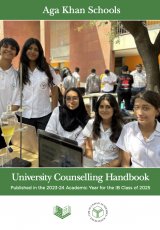
Aga Khan Schools University Counselling Handbook 2023-2024
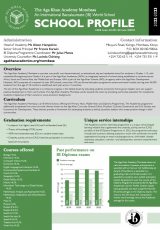
AKA Mombasa IB School Profile 2022-2023
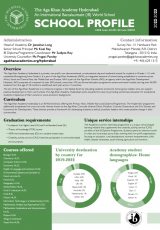
AKA Hyderabad IB School Profile 2022-2023
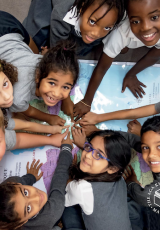
The Aga Khan Academy Maputo
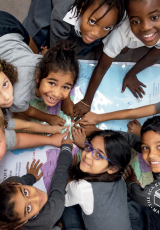
The Aga Khan Academy Maputo
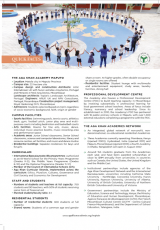
AKA Maputo Quick Facts Sheet (ENG and PT)

Aga Khan Schools Annual Publication 2021
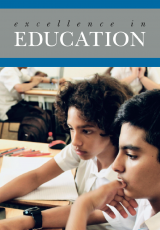
The Aga Khan Academy Dhaka
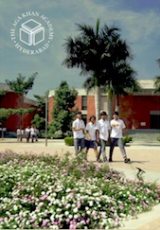
The Aga Khan Academy Hyderabad
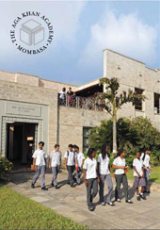
The Aga Khan Academy Mombasa
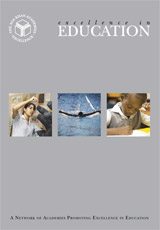
Excellence in Education
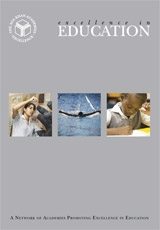
Excellence in Education
Excellence in Education
Publications

Aga Khan Schools University Counselling Handbook 2023-2024

AKA Mombasa IB School Profile 2022-2023

AKA Hyderabad IB School Profile 2022-2023

The Aga Khan Academy Maputo

The Aga Khan Academy Maputo

AKA Maputo Quick Facts Sheet (ENG and PT)

Aga Khan Schools Annual Publication 2021

The Aga Khan Academy Dhaka

The Aga Khan Academy Hyderabad

The Aga Khan Academy Mombasa

Excellence in Education

Excellence in Education
Excellence in Education
Publications

Aga Khan Schools University Counselling Handbook 2023-2024

AKA Mombasa IB School Profile 2022-2023

AKA Hyderabad IB School Profile 2022-2023

The Aga Khan Academy Maputo

The Aga Khan Academy Maputo

AKA Maputo Quick Facts Sheet (ENG and PT)

Aga Khan Schools Annual Publication 2021

The Aga Khan Academy Dhaka

The Aga Khan Academy Hyderabad

The Aga Khan Academy Mombasa

Excellence in Education

Excellence in Education
Excellence in Education
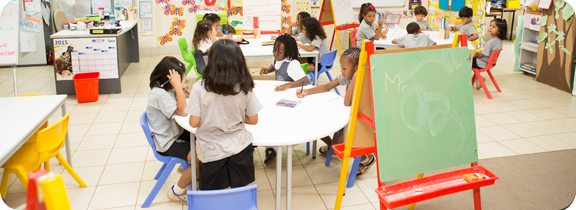
Publications
Please follow the link below to view publications from the Aga Khan Academies.

Aga Khan Schools University Counselling Handbook 2023-2024

AKA Mombasa IB School Profile 2022-2023

AKA Hyderabad IB School Profile 2022-2023

The Aga Khan Academy Maputo

The Aga Khan Academy Maputo

AKA Maputo Quick Facts Sheet (ENG and PT)

Aga Khan Schools Annual Publication 2021

The Aga Khan Academy Dhaka

The Aga Khan Academy Hyderabad

The Aga Khan Academy Mombasa

Excellence in Education

